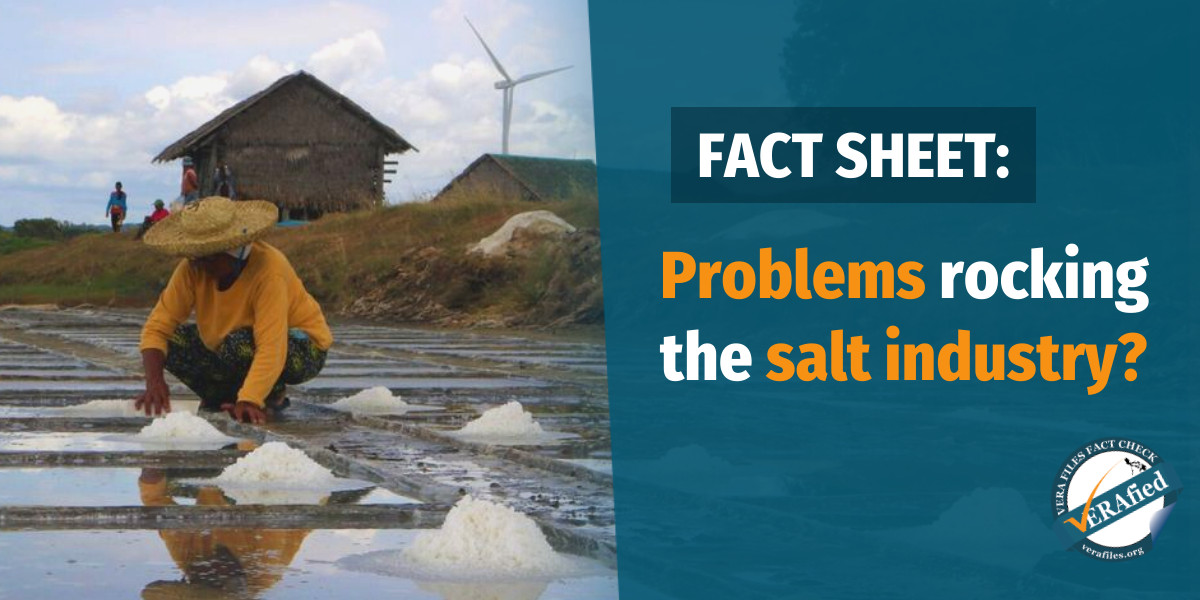The Senate Committee on Agriculture, Food and Agrarian Reform in a Jan. 18 hearing unmasked the long-standing problems besetting the local salt industry that have led to its stifled growth, production and innovation.
Sen. Cynthia Villar, who chairs the committee, said Republic Act No. 8172, known as the Act for Salt Iodization Nationwide (ASIN), has become a “deterrent” to the development of the industry that produced 300,000 metric tons (MT) of salt in 1994, a year before ASIN became law.
Today, the supply of salt in the domestic market is reliant on imports, which has led to calls from local players for the government to resuscitate the industry. They said this is necessary to meet the growing demand of Filipino households and the additional annual demand for 300,000 MT of salt as coconut fertilizer under the 2021 Coconut Farmers and Industry Trust Fund Act.
Why was there a need for the ASIN Law? How has it helped public health? What has been the impact of ASIN on the salt industry?
Here are four things you should know:
1. Why did the country pass ASIN law?
Former president Fidel V. Ramos sought to combat iodine deficiency in the country through the enactment of RA 8172 in December 1995. Two years prior, a survey showed that 12.6% of Filipino children aged 6 to 12 years old suffered from iodine deficiency.
Sufficient iodine nutrition is crucial for the proper growth of young children and is a “most critical” micronutrient for pregnant women for the healthy development of the fetus in the early stages of pregnancy.
To address the problem, the government mandated the integration of iodized salt in the Filipino diet. RA 8172 required all food-grade manufacturers to iodize the salt they produce, distribute or trade. It also compelled restaurants, food outlets and stores to make available only iodized salt in their establishments. The law imposes administrative fines of P1,000 to P100,000 on violators.
As of April 28, 2022, the United States National Institutes of Health reported that this is the “most widely used” strategy to address iodine deficiency in the world.
2. What has been the impact of ASIN on public health?
The country has eliminated iodine deficiency among selected population groups, based on previous national nutrition surveys (NNS).
The NNS tracks the public’s nutritional status and informs the government on policies in eradicating hunger, child malnutrition and improving maternal health. The Department of Science and Technology, through its Food and Nutrition Research Institute, has been conducting the study every five years since 1978.
Iodine levels of school-aged children (6 to 12 years old) is now adequate, according to the last four NNS, the latest of which was published in December 2020. However, pregnant women and women of childbearing age still suffer from mild iodine deficiency over the last decade, based on the 2013 and 2018 NNS.
There is a need to regularly assess the supply and use of iodized salt to achieve sustained elimination of iodine deficiency, according to a 2003 study. It said:
“Experience over the years in Thailand, Guatemala, Colombia, Germany, and countries from the former USSR illustrate that the iodine nutrition status of populations can quickly deteriorate when salt is no longer iodized after a period of adequate iodine nutrition.”
Source: Sage Journals, Iodine Deficiency: Consequences and Progress toward Elimination, October 2003
3. What are the problems besetting the local salt industry?
Salt production in the Philippines has declined over the years, with reports showing that the country imports 93% of its salt supply despite its 36,000-kilometer shoreline from which saltwater could be extracted.
To keep up with the growing population’s demand for salt, there is a need to expand the country’s current 2,000 hectares of salt farm concentrated in Pangasinan and Mindoro by another 18,000 hectares, said Gerard Khonghun, president of the Philippine Association of Salt Industry Networks (PhilASIN) in a Jan. 25 interview on RMN DZXL radio.
If dependence on imported salt is not resolved, the country would be importing 1.3 million tons of salt by 2030 worth P6 billion, Khonghun warned in an October 2022 congressional hearing on a bill to amend ASIN.
Salt farmers bear the brunt of unpredictable weather patterns caused by climate change. Intermittent rain patterns and long dry spells affect salt yield since production heavily relies on the temperature, humidity, sunlight and other weather-dependent factors, based on a study of 52 salt farms in Occidental Mindoro in 2022.
The study also showed a lack of government support to develop post-harvest technology, assure salt quality and increase the capital of salt farmers. These problems have stifled the industry’s growth and “forced farmers to stick to their age-old traditional salt farming methods.”
At worst, salt farmers get stuck in cycles of debt due to low capital, forcing them to downsize or close operations altogether, the study added.
The requirement to iodize all locally produced salt is a problem also ailing the coconut industry, which uses non-iodized salt as fertilizer especially in coconut farms far from coast. The use of rock salt or common table salt as coconut tree fertilizer is known to increase a coconut’s weight and yield per tree.
Villar and Sen. Nancy Binay, in a Jan. 18 Senate hearing, pointed out that to date, no single government agency oversees and helps develop the salt industry.
4. Is there a need to amend ASIN ?
Khonghun clarified that the salt industry’s problems could not be attributed to a singular cause, such as the iodization requirements under RA 8172 which, he said, serves “a good purpose” for public health.
“In the industry, we think that there was a lack of support for our local salt farmers while they supported the salt iodization law. There is just a need to add a developmental law so that we could enhance support for the local salt industry,” he said in Filipino.
Instead of repealing the law altogether, stakeholders of the salt industry are pushing for the coexistence of non-iodized and iodized salt production to meet the demands of Filipino households, food manufacturers and crop producers.
Lawmakers have been proposing amendments to ASIN, filing several bills at the House of Representatives and the Senate since 2017.
House Bill No. 4939, filed on Feb. 1, 2017, proposes that the government allow food manufacturers to use sea salt to boost the competitiveness of local farmers.
Sen. Joel Villanueva also proposed a measure supporting local food-grade and non-food grade salt farmers and artisanal salt producers and providing better technical assistance for the iodization of salt.
It suggests the creation of a P500-million Salt Industry Development Fund to support the programs under the bill, including the procurement of salt iodization machines and financial assistance for small-to-medium salt producers and manufacturers.
In 2022, Villar filed a bill amending the Philippine Fisheries Code of 1998 to encourage salt farming in fish ponds. It also pushes for the creation of a Philippine Salt Industry Development Council to develop and implement policies and programs for the sector.
Have you seen any dubious claims, photos, memes, or online posts that you want us to verify? Fill out this reader request form.
Sources
Official Gazette of the Philippines, Republic Act No. 8172, Dec. 20, 1995
Senate of the Philippines Official Youtube Channel, Committee on Agriculture, Food and Agrarian Reform (January 18, 2023), Jan. 18, 2023
Business World Online, Salt industry output seen held back by reclamation, import competition, Aug. 30, 2022
Bloomberg, Sugar and Salt Shortage Worsens Philippines Food Supply Woes, Sept. 7, 2022
GMA News Online, Philippines to import salt amid supply problems —DA exec, Sept. 7, 2022
Business Mirror, PHL’s salt imports rise 10% in H1–PSA data, Sept. 12, 2022
Bureau of Treasury, Coconut Farmers and Industry Trust Fund, Feb. 26, 2021
Official Gazette of the Philippines, Coconut Farmers and Industry Trust Fund, Feb. 26, 2021
Why did the country pass ASIN Law?
- Official Gazette of the Philippines, Republic Act No. 8172, Dec. 20, 1995
- National Center for Biotechnology Information, Effect of iodine status and other nutritional factors on psychomotor and cognitive performance of Filipino schoolchildren, 2007
- Karger, Iodine Deficiency in Children, 2014
- National Center for Biotechnology Information, Iodine Deficiency in Pregnancy: The Effect on Neurodevelopment in the Child, Feb 18, 2011
- National Center for Biotechnology Information, Monitoring and effects of iodine deficiency in pregnancy: still an unsolved problem?, Jan. 16, 2013
- Food and Agriculture Organization, Department of Health – Revised Implementing Rules and Regulations of Republic Act No. 8172, March 3, 2004
How has it affected public health?
- Elmer Press Journal of Endocrinology and Metabolism, Iodine Deficiency Disorder Among Filipino School Children, Pregnant and Lactating Women and the Elderly 20 Years After the Act for Salt Iodization Nationwide Law, June 2017
- Food and Nutrition Research Institute (DOST), Expanded National Nutrition Survey (2018), December 2020
- National Center for Biotechnology Information, Iodine Status in Filipino Women of Childbearing Age, September 2018
- Food and Nutrition Research Institute (DOST), 8th National Nutrition Survey Anthropometric Survey (2013), July 2015
- Food and Nutrition Research Institute (DOST), The National Nutrition Survey, Accessed Jan. 25, 2023
- Sage Journals, Iodine Deficiency: Consequences and Progress toward Elimination, October 2003
What are the salt industry’s problems?
- Inquirer.net, ‘Shameful’ for archipelagic PH to import salt, says Villanueva, Aug. 27, 2022
- Department of Agriculture, NGAs to work double time to enhance salt production, Aug. 28, 2022
- CNN Philippines, ₱100M to boost salt production — BFAR, Aug. 30, 2022
- RMN DZXL, STRAIGHT TO THE POINT – 01/25/2023 – 8:00 A.M – 9:30 A.M, Jan. 25, 2023
- CNN Philippines, 96% of PH salt might be imported by 2030, group warns, Oct. 25, 2022
- Inquirer.net, 96% of salt will be imported to PH by 2030 if industry not revived, producers warn, Oct. 25, 2022
- Malaya, PH to rely on imported salt if self-sufficiency not hit by 2030, Oct. 26, 2022
- Cognizance Journal, CONSTRAINTS AND CHALLENGES OF SALT FARMING IN OCCIDENTAL MINDORO, PHILIPPINES, June 2022
- GMA News Online, Senators question 1995 law requiring all locally-produced salt to be iodized, Jan. 18, 2023
- Business World Online, Iodized salt law blamed for decline in PHL output, Jan. 18. 2023
- Manila Bulletin, Senators seek development, revitalization of ‘diminishing’ PH salt industry, Jan. 18, 2023
- Business Mirror, PCA urges farmers to use salt as coconut fertilizer, Nov. 3, 2014
- Food and Agriculture Organization, Use of salt (sodium chloride) as fertilizer for coconut [1988], 1988
- Philippine Coconut Authority, Common Salt Fertilization on Coconuts, Accessed Jan. 26, 2023
What is being done?
- RMN DZXL, STRAIGHT TO THE POINT – 01/25/2023 – 8:00 A.M – 9:30 A.M, Jan. 25, 2023
- House of Representatives, House Bill No. 4939, Feb. 1, 2017
- Senate of the Philippines, De Lima calls for review of ASIN Law implementation, May 20, 2018
- Senate of the Philippines, Senate Bill No. 1450, Nov. 3, 2022
- Senate of the Philippines, Senate Bill No. 1334, Sept. 20, 2022
- Senate of the Philippines, Senate Bill No. 1685, Jan. 17, 2023
(Guided by the code of principles of the International Fact-Checking Network at Poynter, VERA Files tracks the false claims, flip-flops, misleading statements of public officials and figures, and debunks them with factual evidence. Find out more about this initiative and our methodology.)




